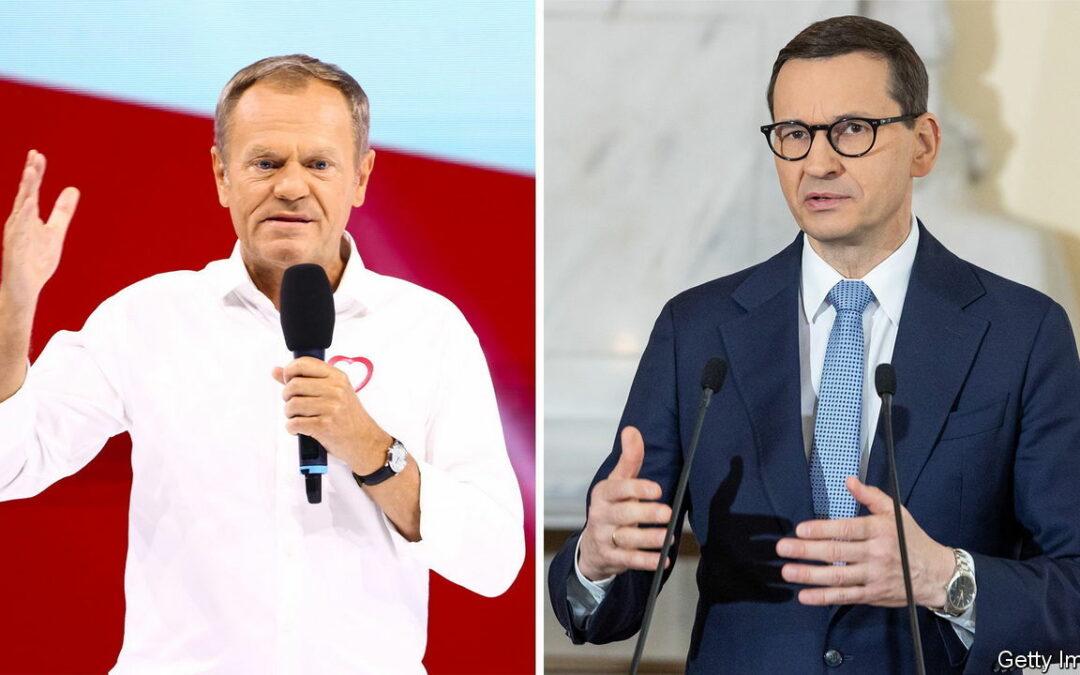ON OCTOBER 9TH Mateusz Morawiecki, Poland’s prime minister, and Donald Tusk, a former prime minister and the leader of the main opposition party, faced each other in a televised debate, six days before national elections. Four other candidates were on stage, but the two men paid them little heed. “I don’t know what they poured into your glass, you’re excited and aggressive,” snapped Mr Tusk. Mr Morawiecki accused his opponent’s party of selling off national treasures. “They’d sell our forests, the Baltic [Sea] and the Tatra [Mountains],” he claimed. Their exchange was representative of a campaign that has dripped vitriol. Both sides have accused the other of cronyism and treason, eagerly trading comparisons to Nazis and Soviets. Why has it been so nasty?
The election is a toss-up. Mr Morawiecki’s Law and Justice (PiS) party, which is polling at 36%, is poised to take the largest share of the vote. But to form a government it will need the support of others, and it is not clear that it will secure it. The far-right Confederation party, on 9%, could hold the balance of power. If the opposition does well it could forge a ruling coalition instead. Civic Coalition (KO), an alliance which includes Mr Tusk’s Civic Platform (PO) and several centrist and left-wing parties, is polling at around 30%. It would probably work with the Left and the Third Way, a centrist newcomer, each at 10%.
The stakes are unusually high. PiS has been in power for two terms—and no party has yet won a third consecutive stint in office. In the past eight years, Mr Morawiecki’s party has packed courts and filled public media with propaganda. Its assault on the rule of law led the European Commission to freeze billions of euros of pandemic funds earmarked for Poland. The opposition fears that another four years would allow PiS to turn Poland into an authoritarian state, and take it out of the EU. PO has promised to put ruling-party politicians in jail for theft and breaching the constitution.
In such a close race, turnout will be a deciding factor. PiS needs to motivate voters in its rural strongholds, where turnout tends to be lower than in cities—57% compared with 64% at the previous election in 2019. To do so it has presented an opposition victory as a doomsday scenario that might lead to an increase in the retirement age (which PiS lowered) and cuts to benefits (which PiS has doled out generously). It has used the state broadcaster, TVP, to launch relentless personal attacks on Donald Tusk, a former president of the European Council. Mr Tusk’s German heritage is played up. He is portrayed, with scant evidence, as plotting with European bureaucrats, German and even Russian leaders to undermine Poland’s independence. Meanwhile the opposition hopes that mudslinging by both sides might deter wavering PiS voters: those already repulsed by the nastiness of politics might not show up at the polls.
But the hostility is not just for show: this election really is personal. Mr Morawiecki worked for Mr Tusk as an economic adviser from 2010 until 2012. (“I won’t have advisers like this again,” gibed Mr Tusk during this week’s debate.) And the hatred between Mr Tusk and Jaroslaw Kaczynski, the leader of PiS and a former prime minister, runs much deeper. Their feud is almost as old as modern Poland and has come to define much of its politics. Mr Kaczynski has long argued that the country’s transition out of communism in the 1990s unfairly vested power and money in the hands of liberal big-city elites, represented by Mr Tusk. He also blames his rival for a plane crash in 2010 that killed his twin brother Lech, then Poland’s president, although official investigations have cleared Mr Tusk of responsibility. At a rally in August, Mr Kaczynski described his opponent as “pure evil”. This year’s vote may be their last chance to settle scores. Mr Tusk is 66, Mr Kaczynski 74—and a new generation of voters is tired of their duelling. ■









